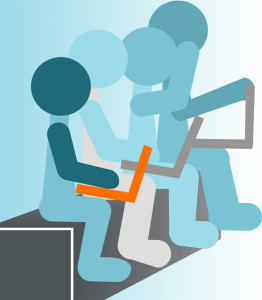Exploring Technology, Enquiry, and Pedagogy
Monitoring emerging trends in learning technology and guiding the development of innovative teaching practice is a core activity of the Technology Enhanced Learning (TEL) team here at the University of Sussex.
On 26th June 2014, Nick Botfield, Learning Technologist with responsibility for supporting the science cluster of schools at Sussex, attended the e-Pedagogy, e-Learning and Blended Learning event at Middlesex University. The event focused on how technology, and particularly social media, could be implemented into learning and teaching.
The background
Hosted by the Higher Education Academy (HEA), the event aimed to “offer practical alternatives to embedding social media in academic curricula and provide an interactive opportunity for academics, researchers, and practitioners with or without social media experience, to discuss and explore the use and applications of social media in higher education”.
Social Media Success
After a short introduction from Pro-Vice Chancellor Jan Williams, the event began with an enlightening talk from Claudia Megele (@claudiamegele) who described her work implementing social media into a social work course.
Claudia found that, although there was a lot of work involved on her part and there were some students who were less competent than first expected, generally the use of social media throughout the course was a success. She went on to describe how the process of students using social media during their studies was just as important as the results they gained, as using technology for their course promoted skills that they will eventually need to apply in their working lives.
Dr Peter Buzzi then discussed the development of a social media culture with its own hierarchies and language, and how this can be harnessed in a higher education setting. This was elaborated on by Steve Chilton and Kirsteen MacDonald who reported on how academics were currently using social media in their teaching and research.
Learning with Video
Angus MacDonald later discussed the production and use of video at Middlesex University. Angus separated the types of video content in e-learning into four categories, and broke down the popularity of each at Middlesex.
- lecture-based (or substitutional)
- enhanced
- supplementary
- worked examples
Examples were given of where videos had worked well (and not so well) and feedback academics had received after uploading their videos onto YouTube.
Flipped classroom & MOOCs
Dr Peter Buzzi gave an impassioned talk on Flipped Classrooms and MOOCs. A key theme was the question of what students were currently being assessed on and whether or not this was suitable in the new digital/communication age. Using flipped classrooms and MOOCs as examples, Dr Buzzi looked at the difference between application-driven pedagogies (the student ‘applying’ what they have learned outside of the classroom) and content-driven pedagogies (the ‘content’ that the student needs to learn).
Dr Buzzi also looked at future technologies such as Google Glass and stated his belief that “if your assessments can be answered using Google, perhaps you’re asking the wrong questions”.
The event was a real success, prompting thought-provoking discussion which continued on social media. You can follow the conversation on Twitter via the hashtag #SWSCmedia
Image credit: creative commons licensed (BY) flickr photo by algogenius: http://flickr.com/photos/59939034@N02/5476290876



